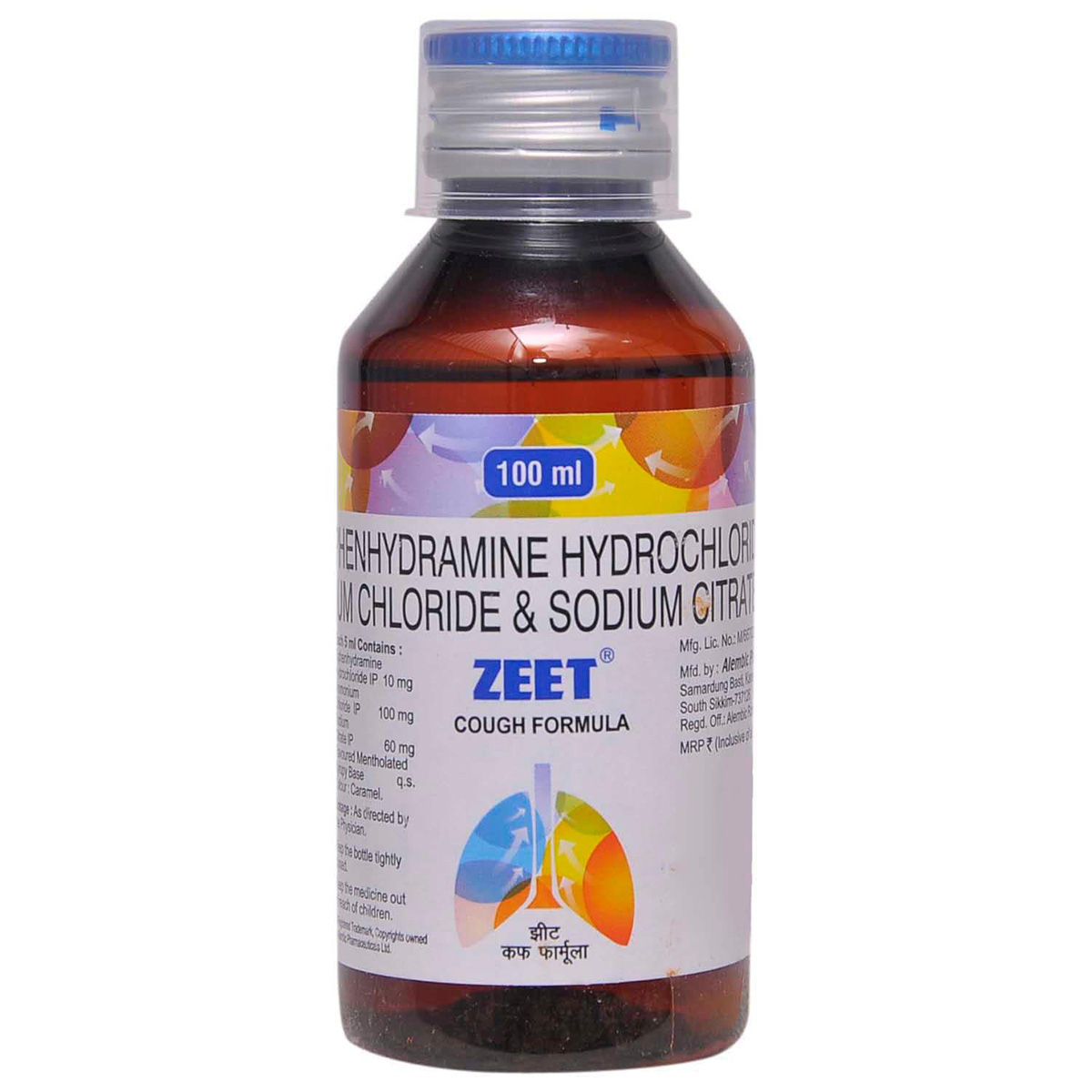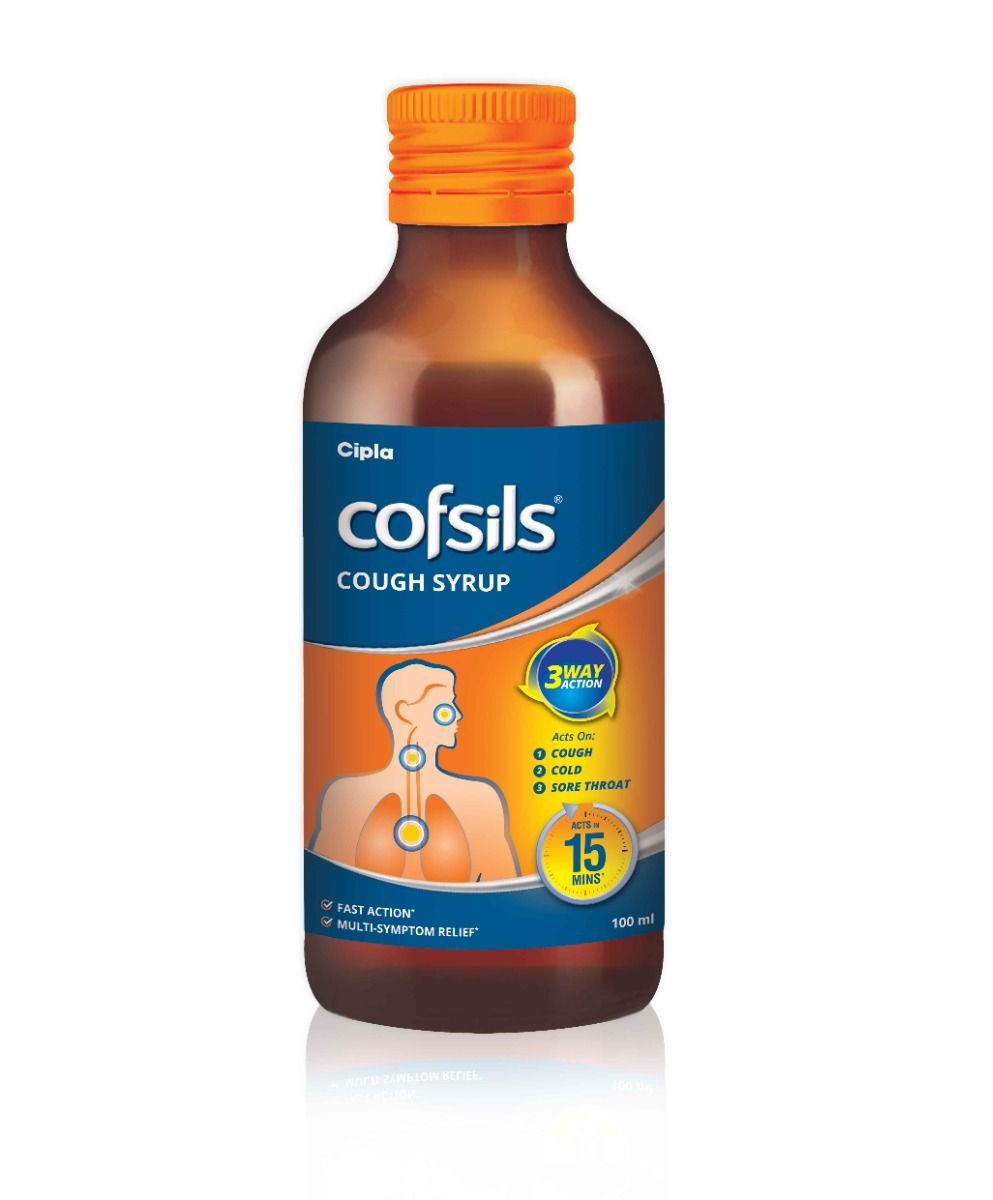Ammonium Chloride+diphenhydramine
About Ammonium Chloride+diphenhydramine
Ammonium Chloride+diphenhydramine belongs to a group of medicines called expectorants and cough products used to relieve cough accompanied by cold symptoms such as sore throat, runny nose, watery eyes, and sneezing. Additionally, Ammonium Chloride+diphenhydramine also helps in providing relief from allergies. Coughing (dry or productive) is the body's way of clearing irritants (like allergens, mucus or smoke) from airways, thereby helps in preventing respiratory infection.
Ammonium Chloride+diphenhydramine contains Ammonium chloride (expectorant) and Diphenhydramine (antihistamine). Ammonium chloride helps in loosening the congestion in the chest and throat, thereby making it easier to cough out phlegm through the mouth. Diphenhydramine works by blocking the action of a chemical substance called histamine, which is responsible for causing allergic reactions. Together, Ammonium Chloride+diphenhydramine provides relief from cough.
You are advised to take Ammonium Chloride+diphenhydramine for as long as your doctor has prescribed it for you depending on your medical condition. In some cases, you may experience certain common side-effects such as headache, stomach upset, dizziness, tiredness, and dry mouth. Most of these side-effects do not require medical attention and will resolve gradually over time. However, you are advised to talk to your doctor if you experience these side-effects persistently.
Consult your doctor if you are pregnant or planning for pregnancy. Avoid taking Ammonium Chloride+diphenhydramine if you are breastfeeding. Ammonium Chloride+diphenhydramine may cause dizziness, so drive only if you are alert. Ammonium Chloride+diphenhydramine is not recommended for children below 6 years. Avoid consuming alcohol with Ammonium Chloride+diphenhydramine as it could lead to increased dizziness. Inform your doctor about all the prescription, non-prescription and herbal medicines you take to rule out any side-effects/interactions.
Uses of Ammonium Chloride+diphenhydramine
Medicinal Benefits
Ammonium Chloride+diphenhydramine is a combination of two drugs, namely: Ammonium chloride and Diphenhydramine. Ammonium Chloride+diphenhydramine is used to provide relief from cough accompanied by cold symptoms such as sore throat, runny nose, watery eyes, and sneezing. Additionally, Ammonium Chloride+diphenhydramine helps in providing relief from allergies. Ammonium chloride is an expectorant that helps in loosening the congestion in the chest and throat, thereby making it easier to cough out phlegm through the mouth. Diphenhydramine is an antihistamine that works by blocking the action of a chemical substance called histamine, which is responsible for causing allergic reactions. Together, Ammonium Chloride+diphenhydramine provides relief from cough.
Directions for Use
Storage
Side Effects of Ammonium Chloride+diphenhydramine
- Headache
- Stomach upset
- Dizziness
- Tiredness
- Dry mouth
Drug Warnings
Do not take Ammonium Chloride+diphenhydramine if you are allergic to any of its contents. Inform your doctor if you have asthma, prostate problems, narrow-angle glaucoma, stomach or bowel ulcers, glucose-galactose malabsorption, sucrase-isomaltase deficiency, fructose intolerance, kidney or liver problems; if you are taking antidepressants or anti-Parkinson drugs or have taken them in the last 14days. Consult your doctor if you are pregnant or planning for pregnancy. Avoid taking Ammonium Chloride+diphenhydramine if you are breastfeeding. Ammonium Chloride+diphenhydramine may cause dizziness, so drive only if you are alert. Ammonium Chloride+diphenhydramine is not recommended for children below 6 years. Avoid consuming alcohol with Ammonium Chloride+diphenhydramine as it could lead to increased dizziness.
Drug Interactions
Drug-Drug Interaction: Ammonium Chloride+diphenhydramine may interact with an antidepressant (isocarboxazid, phenelzine, tranylcypromine), anti-Parkinson agent (rasagiline, selegiline).
Drug-Food Interaction: No interactions found/established.
Drug-Disease Interaction: Inform your doctor if you have asthma, prostate problems, narrow-angle glaucoma, stomach or bowel ulcers, glucose-galactose malabsorption, sucrase-isomaltase deficiency, fructose intolerance, kidney or liver problems.
Drug-Drug Interactions Checker List:
Safety Advice

Alcohol
unsafeAvoid consumption of alcohol while taking Ammonium Chloride+diphenhydramine as it may cause increased dizziness.

Pregnancy
cautionPlease consult your doctor if you have any concerns regarding this; your doctor will prescribe only if the benefits outweigh the risks.

Breast Feeding
unsafeAvoid taking Ammonium Chloride+diphenhydramine if you are breastfeeding.

Driving
cautionAmmonium Chloride+diphenhydramine may cause dizziness. Do not drive or operate machinery unless you are alert.

Liver
cautionDose adjustment may be needed in patients with liver impairment. Please consult your doctor if you have a liver impairment or any concerns regarding this.

Kidney
cautionDose adjustment may be needed in patients with kidney impairment. Please consult your doctor if you have kidney impairment or any concerns regarding this.

Children
cautionAmmonium Chloride+diphenhydramine is not recommended for children below 6years.
Habit Forming
Diet & Lifestyle Advise
- Wash your hands with soap and water regularly to prevent the spread of germs.
- Drink plenty of fluids to avoid dehydration.
- Gargle with salt water for relief from sore throat.
- Avoid smoking and consumption of alcohol.
- Avoid processed or refined foods. Replace baked foods, fried foods, white bread, white pasta, French fries, sugary desserts and chips with green leafy vegetables.
- Drink plenty of fluids to avoid dry throat.
- Avoid citrus fruits as it may worsen the cough.
- Eat fruits rich in water content such as pears, watermelon, peaches and pineapples.
Special Advise
- Ammonium Chloride+diphenhydramine might affect allergy skin tests. Inform the person doing the tests that you are taking Ammonium Chloride+diphenhydramine.
- Use Ammonium Chloride+diphenhydramine with caution if you are older than 65 years as you might be more prone to side-effects.
Patients Concern
Disease/Condition Glossary
Cough: Coughing is the body's way of clearing irritants (like allergens, mucus or smoke) from airways and preventing infection. Cough can be dry or productive. A productive cough (wet cough) develops sputum (phlegm or mucus) from the lungs, whereas a dry cough does not produce sputum. Cough is commonly caused as a response to allergy or viral infection but coughing up mucus is possibly an indication of infection in the respiratory tract.
FAQs
Ammonium Chloride+diphenhydramine is used to relieve cough accompanied by cold symptoms such as sore throat, runny nose, watery eyes, and sneezing. Additionally, it also helps in providing relief from allergies.
Ammonium Chloride+diphenhydramine is a combination of two drugs, namely: Ammonium chloride and Diphenhydramine. Ammonium chloride helps in loosening the congestion in the chest and throat, thereby making it easier to cough out through the mouth. Diphenhydramine works by blocking the action of a chemical substance called histamine, which is responsible for causing allergic reactions. Together, Ammonium Chloride+diphenhydramine provides relief from cough.
Do not stop taking Ammonium Chloride+diphenhydramine on your own as it may worsen your cough or cause recurring symptoms. Therefore, take Ammonium Chloride+diphenhydramine for as long as your doctor has prescribed it. If you experience any difficulty while taking Ammonium Chloride+diphenhydramine, please consult your doctor.
Ammonium Chloride+diphenhydramine contains diphenhydramine, an antihistamine that helps in treating allergies. It helps relieve a runny nose, watery eyes, sneezing and sore throat.
Dry mouth could be a side-effect of Ammonium Chloride+diphenhydramine. Limiting caffeine intake, avoiding smoking, drinking water regularly and chewing sugar-free gum/candy might stimulate saliva and prevent drying of the mouth.
Ammonium Chloride+diphenhydramine should not be taken for longer durations unless prescribed by the doctor. If your condition does not improve despite taking Ammonium Chloride+diphenhydramine for a week, consult your doctor, he/she may prescribe an alternate medicine.
Do not take an antidepressant or anti-Parkinson medicines such as isocarboxazid, phenelzine, rasagiline, tranylcypromine, or selegiline along with Ammonium Chloride+diphenhydramine as it could lead to very high blood pressure.
Ammonium Chloride+diphenhydramine belongs to a group of medicines called expectorants and cough products. It contains two key ingredients: ammonium chloride (an expectorant) and diphenhydramine (an antihistamine). Together, they work to provide relief from cough and cold symptoms.
You should take Ammonium Chloride+diphenhydramine at the time and dosage your doctor prescribes or as directed on the label. Typically, it is taken every 4-6 hours to help relieve cold and cough symptoms. If you are unsure when to take Ammonium Chloride+diphenhydramine, consult your doctor.
Ammonium Chloride+diphenhydramine is generally not recommended during pregnancy or breastfeeding. It can pass into breast milk and may harm the baby. It may also reduce breast milk production. If you are pregnant, planning to become pregnant, or breastfeeding, please inform your doctor. They will carefully assess the benefits and risks before deciding whether Ammonium Chloride+diphenhydramine is right for you.
Some common side effects of Ammonium Chloride+diphenhydramine include headache, stomach upset, dizziness, tiredness, and dry mouth. Most of these side effects do not require medical attention and will resolve gradually. However, if they persist or become bothersome, you are advised to consult your doctor.
When taking Ammonium Chloride+diphenhydramine, it's essential to follow safe usage guidelines. To minimize risks and maximize benefits, remember to take the prescribed dose exactly as directed, avoiding overdoses. If you become pregnant, inform your doctor immediately. Additionally, monitor your body's response and report any adverse effects. Refraining from alcohol consumption during treatment is also recommended, as it may interact with the medication. Furthermore, avoid taking any other medications, supplements, or herbal products unless your doctor advises. This will help prevent potential interactions and ensure a safe and effective treatment experience.
When taking Ammonium Chloride+diphenhydramine, being aware of potential interactions with other medications is essential. This medication may interact with certain drugs, such as antidepressants (e.g., Phenelzine) and anti-Parkinson drugs (e.g., Rasagiline). Avoid taking Ammonium Chloride+diphenhydramine if you have used these medications in the past 14 days. Please note that this list is not exhaustive, and Ammonium Chloride+diphenhydramine may interact with other medications not mentioned here. To ensure your safety, inform your doctor about all medications, supplements, and herbal products, including over-the-counter and prescription drugs. Your doctor will help manage potential interactions and provide personalized guidance.








